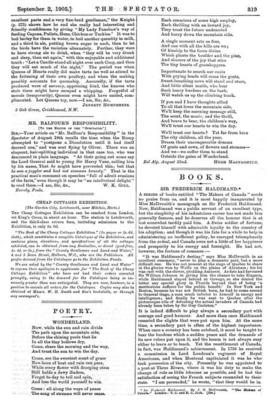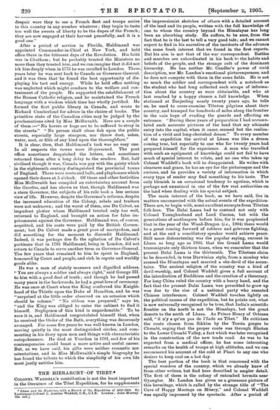A SERIES of books entitled "The Makers of Canada" needs
no praise from us, and it is most happily inaugurated by Miss Mellwraith's monograph on Sir Frederick Haldimand. Now, Haldimand was a public servant of an excellent type, but the simplicity of his industrious career has not made him generally famous, and he deserves all the honour that is at last somewhat tardily paid him. A Swiss soldier of fortune, he devoted himself with admirable loyalty to the country of his adoption; and though it was his fate for a while to help in
administering an inefficient policy, he emerged triumphantly, from the ordeal, and Canada owes not a little of her happiness and prosperity to his energy and foresight. He had not, however, the fortune of romance :— " It was Haldimand's destiny," says Miss MeIlwraith in an excellent summary, "never to play a dramatic part, but a more difficult one. He was not present at the siege of Quebec to share in the glories won by Wolfe on the plains of Abraham; his lot was cast with the slower, plodding Amherst. As fate had favoured Sir William Johnson in giving him the chance to take Niagara,. while Haldimand stayed behind at Oswego, so she denied the latter any special glory in Florida beyond that of being a meritorious sufferer for the public benefit.' In New York and Boston, because he was not British born, he had to come second to General Gage, a man much inferior to himself in energy and intelligence; and finally he was sent to Quebec after the picturesque rtile of defeating the actual invaders of Canada had already been taken by Sir Guy Carleton."
It is indeed difficult to play always a secondary part with courage and good humour. And more than once Haldimand resented the slights that were put upon him. At the same
time, a secondary part is often of the highest importance. When once a country has been subdued, it must be taught to bear the burdens which a sudden peace and the demands of its new rulers put upon it, and the lesson is not always easy either to learn or to teach. Yet the resettlement of Canada, in fact, was Haldimand's achievement. In 1756 he received a commission in Lord Loudoun's regiment of Royal' Americans, and when Montreal capitulated it was he who took possession of the city. Presently he was appointed to- e post at Three Rivers, where it was his duty to make the change of rule as little 'irksome as possible, and he had the satisfaction of seeing the French subjects reconciled to theirs state. "I am persuaded," he wrote, "that they would be in
* Sir Frederick Halditnand. By J. N. McIlwraith. "The Makere of Canada." London: T. C. and B. C. Jaok. Ns.)
despair were they to see a French fleet and troops arrive in this country in any number whatever ; they begin to taste too well the sweets of liberty to be the dupes of the French ; they are now engaged at their harvest peacefully, and it is a good one."
After a period of service in Florida, Haldimand was appointed Commander-in-Chief at New York, and held office there in the bitterest days of the Revolution. His faith was in Chatham ; but he probably trusted the Ministers no more than they trusted him, and we can imagine that it did not irk him deeply when in 1775 he was recalled to London. Three. years later he was sent back to Canada as Governor-General, and it was then that he found the best opportunity of dis- playing his tact and energy. While he held office nothing was neglected which might conduce to the welfare and con- tentment of the people. He supported the establishment of the Roman Catholic religion, and he maintained the French language with a wisdom which time has wholly justified. He formed the first public library in Canada, and wrote to Richard Cumberland for advice in the choice of books. The primitive state of the Canadian cities may be judged by the proclamations cited by Miss McIlwraith. Here are a couple of them :—"No horses or hogs are to be suffered to stray in the streets." "No person shall clean fish upon the public streets, especially large sturgeon, nor throw dust, ashes, water, soot, or filth of any kind upon the thoroughfare."
It is clear, then, that Haldimand's task was no easy one. In all respects the towns were ill-governed. The post office sometimes despatched the letters, and sometimes returned them after a long delay to the senders. But, half civilised though it was, Canada was gay with the gaiety which in the eighteenth century distinguished the provincial towns of England. There were routs and balls, and playhouses which opened their doors at 5 o'clock. Of these and other festivities Miss McIlwraith has compiled an entertaining account from the Gazelles, and has shown us that, though Haldimand was a stern Governor, the subjects of his rule took a less serious view of life. However, despite the Governor's reforms, despite the increased education of the Colony, rebels and traitors were not unknown ; and the worst of them, one Du Calvet, an impudent plotter whom Haldimand treated only too well, returned to England, and brought an action for false im- prisonment against the Governor. Haldimand was, of course, acquitted, and his costs were paid by the British Govern- ment; but Du Calvet made a great pose of martyrdom, and did something for the moment to discredit Haldimand. Indeed, it was perhaps due Co the agitation of Du Calvet's partisans that in 1785 Haldimand, being in London, did not return to Canada to serve another term as Governor-General. The few years that remained to him he spent in England, honoured by Court and people, and rich in repute and worldly goods alike.
He was a man of stately manners and dignified address. "You are always a soldier and always right," said George III. to him with a good deal of truth ; and though he had passed many years in the backwoods, he hacl a great love of ceremony. He was once at Court when the King conferred the Knight- hood of the Thistle upon the Duke of Hamilton, and he was "surprised at the little order observed on an occasion which should be solemn." "No ribbon was prepared," says he, "and the King was obliged to enter the cabinet to find it himself. Negligence of this kind is unpardonable." To be sure it is, and Haldimand congratulated himself that, when he received the Order of the Bath, everything was decorously arranged. For some five years he was well-known in London, moving quietly in the most distinguished circles, and com- menting in his diary upon men and things with characteristic outspokenness. He died at Yverdun in 1791, and few of his contemporaries could boast a more active and useful career. But, as we have 'said, his gifts were neither romantic nor ostentatious, and in Miss McIlwraith's simple biography he lias found the tribute to which the simplicity of his own life most justly entitles him.



































 Previous page
Previous page